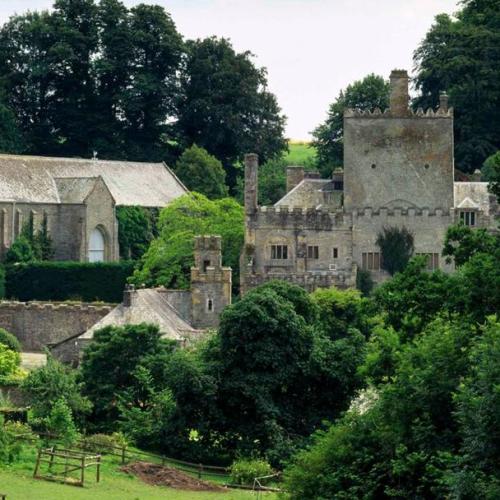Rare Medieval Music At Buckland Abbey
For the first time in nearly five centuries, Buckland Abbey in Devon will once more will be filled with the sounds of monastic music.
The Cistercian abbey, now in the care of the National Trust, was once alive with music, the resident monks and choirboys singing for hours every day. But it fell silent at the Dissolution of the Monasteries, when every abbey and priory in England was shut down by King Henry VIII.
There has been a collaboration between the National Trust and the University of Exeter, supported by the Arts & Humanities Research Council.
They researched a rare 15th century manuscript. Most books and manuscripts were lost or destroyed during the Dissolution and reform.
The centuries-old book was once owned and used by the abbey. It is now part of the British Library’s collection and will return on loan to Buckland Abbey for the first time since the Dissolution of the monasteries.
Known as a ‘customary’, the richly decorated Buckland Book (c. 1450) contained the instructions the monks needed to carry out their daily religious rituals and services.
Unusually, it also contains a rare collection of medieval music copied and added to the book in the early Tudor period.
The music is in a style called ‘plainchant’, with single lines of music for monks or priests to sing all together.
What makes the music more unusual is that rather than following the rigid liturgical structure of the time, with particular pieces sung at different times of the day, the monks curated a unique sequence of chants drawn from various sources. Whoever compiled this collection seems to have been unusually creative, pulling together words and music from many different sources.
Another unusual thing about the manuscript is that is gives the name of the abbey’s choir master and organist from this time. Robert Derkeham began living and working at the monastery in 1522 and stayed there for more than 15 years, until it closed and he was pensioned off. It’s exceptionally rare to be able to connect a book of medieval music like this with the specific musician who performed it.
The pieces found in the book ask for God’s mercy, forgiveness and protection from harm. They share a real feeling of anxiety and fear. It looks as though they were once sung as a complete sequence, perhaps to help the monks through a crisis of some kind.
One theory is that the music was intended as a response to the sweating sickness, which broke out repeatedly in Tudor England.
Before the Tudor Reformation, every part of England and Wales had places like this dedicated to creative music-making and performance. Through this research everyone can now learn much more about this tradition and what it meant not only for the musicians but also for the surrounding communities that shared in their art.
Although the music is written down using the same notation that’s still used in the modern Catholic Church, it doesn’t give any instructions about rhythm or dynamics, so there had to be decisions about how the pieces should sound. This is one of the most interesting, and also most challenging, parts of performing music that’s over 500 years old!
Experts are still trying to complete he history of the book and find out what happened to the Buckland Book between the closure of the abbey and when it was acquired by the Harley family in the 1720s, before being sold to the British Museum in 1753.
Perhaps one of the monks took the book with him, and it remained quietly on a shelf after the hoped-for reversal of the Dissolution didn’t come.
Working in partnership, the National Trust and University researchers have now transcribed the music for its first performance in nearly five centuries. The University of Exeter Chapel Choir has recorded the music, bringing the voices of the long-lost monks back to life.
The recording will form part of the soundtrack to a new exhibition featuring the Buckland Book, Opening the Buckland Book: Music and community in a Tudor monastery (5 July – 31 October 2025).
The University of Exeter Chapel Choir will also perform the music live in Buckland Abbey’s medieval Great Barn on 16 and 17 August 2025. The event is supported by the Arts and Humanities Research Council through an Impact Accelerator Account Award.


